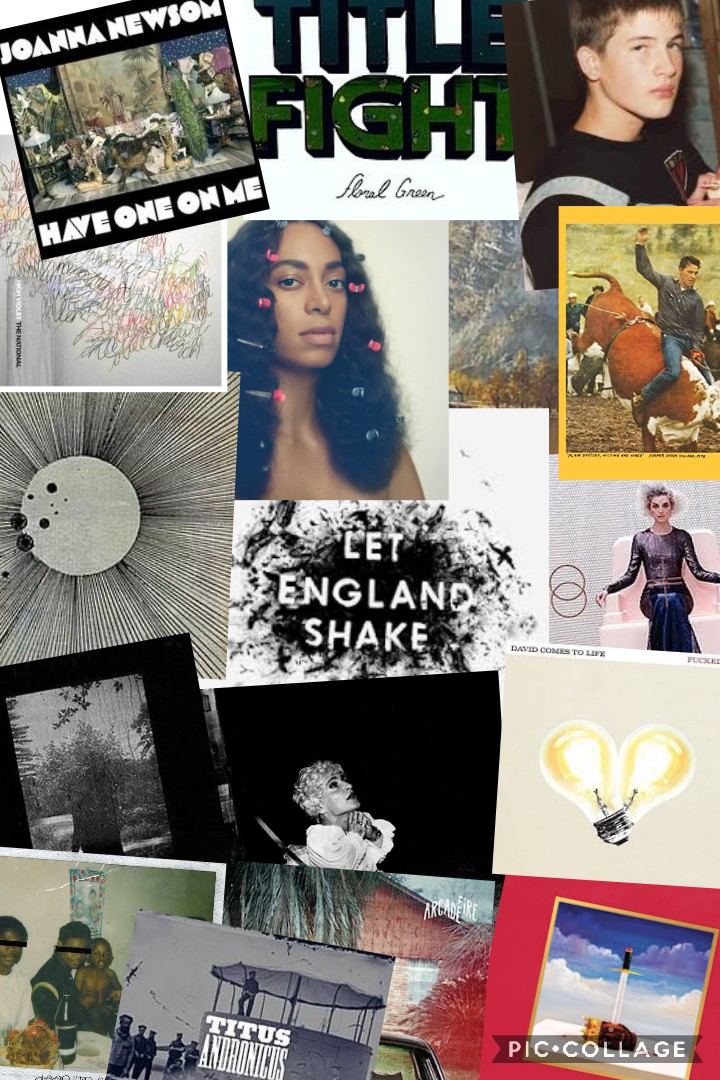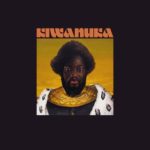Fucked Up – David Comes to Life (2011)
In the end, my favourite album of the decade was always going to be Fucked Up. When I sat down to whittle down my longlist (initially of about 300, then 100, then this 20) I had no earthly idea what I was going to pick. However, when I got down to 20, David Comes to Life immediately stood tall and I never looked back. Fucked Up are one of my favourite bands of all time. Their 2006 record Hidden World is in my top 5 albums of all time, at this current time, I would choose their single ‘Year of the Ox’ – released a year before David – to be played at my funeral. So with all that in mind, of course, it had to be David Comes to Life, the band’s greatest, most ambitious achievement. The opening notes of ‘Let Her Rest’ is enough to make me tear up instantly and the album’s intensity never really lets up from there. It is a singular vision of brilliance that touches upon love, death and philosophy. It is, arguably, the best punk album of all time.
Kendrick Lamar – Good Kid, m.A.A.d City (2012)
Kendrick is the most important artist of this decade, there are no two ways about it. He’s released three incredible, distinct albums over the past ten years which both revolutionised the way we think about and consume rap music but also had a real-life impact on social movements such as #BlackLivesMatter. While To Pimp a Butterfly is Lamar’s magnum opus, I find myself more consistently reaching for Good Kid; a deeply personal reflection on his upbringing and tracks such as ‘Bitch Don’t Kill My Vibe’ and ‘Sing About Me, I’m Dying of Thirst’, is breathtaking.
Joanna Newsom – Have One on Me (2010)
Like many, I had no idea what to make of Joanna Newsom at first. That utterly distinguishable voice, those epic song structures, her harp-playing, it remains unlike anything else I’ve ever listened to. The moment it clicked, however, was when I took a chance at seeing Newsom live on the Have One on Me tour at Glasgow’s Royal Concert Hall. I bought a ticket last minute at the very back of the hall, and despite the distance from the stage, I was immediately floored by her performance. That context cracked her music for me, and thus I was soon hooked, not just on her most recent album, but also her previous albums Ys and The Milk-Eyed Mender. Have One on Me is not an easy listen, it is a dense triple-disc album which requires patience and a lot of digging. However, there is something so soulful about this devastating break-up record, that it rewards the listener with every go-around.
The National – High Violet (2010)
In a similar transition to Kanye and Kendrick this decade, last decade saw Interpol fall away and leave the door open for The National as the perennial atmospheric indie-rock band of a decade full of them. High Violet is a culmination of that journey, capitalising on all their hard work touring Alligator and Boxer before it, this was the moment the band rightly exploded onto the mainstream conscious, where they’ve fairly successfully remained ever since. The rest of this decade’s releases have all been solid enough, but High Violet remains the high benchmark to clear in indie rock this decade, one many attempted but could never quite scale.
Grouper – Ruins (2014)
An extremely personal choice, here. My first article for GodisintheTV saw me open about my struggle with depression and, as then, my diagnosis of bipolar disorder and how Liz Harris’s music kept me afloat. Since then, I have been in a much better place – to the point that I feel my diagnosis may have been a little bit hasty – and I can now listen to Grouper’s music more for relaxation rather than to soothe an aching depression. Truly, any of her work could and should feature on these lists, I am merely sticking with Ruins because it was my entry point to her incredibly moving music.
Arcade Fire – The Suburbs (2010)
I am an Arcade Fire fan who believes Neon Bible is unfairly maligned. After all, without it, you don’t get their much more popular album, The Suburbs. The Montreal multi-man outfit found a winning formula exploring the tedium and underlying tension of American suburbia through their titular concept album. It is a smidge too long (the ‘Half Light’ tracks are not quite up to the same standard, while ‘We Used to Wait’ probably would have been stronger as a standalone single) but as the name of the album’s biggest single suggests, it needs that sprawl to fully explore its lofty themes and ideas. It also helps that Arcade Fire were on incredible form on this tour, but their diminishing returns since has been no coincidence.
Kanye West – MBDTF (2010)
A little part of me wanted to put Yeezus here. While it’s not quite the major thesis statement that My Beautiful Dark Twisted Fantasy, there is punk energy to Yeezus that often appeals to me a great deal more. However, there’s just no denying West’s masterwork, a brilliantly inventive, sprawling and emotional record which briefly saw Kanye on top of the world before he would disappear into his god delusion and leave the throne empty for Kendrick to take up the mantle. Still, almost an entire decade later, MBDTF, remains every bit of enthralling as when it was unleashed at the turn of the decade. ‘POWER’ continues to be used in every trailer ever, ‘MONSTER’ introduced us to Nicki Minaj and ‘Runaway’ continues to be as beautiful as when it was penned. And that’s just a snapshot of this now-legendary album.
Deerhunter – Halcyon Digest (2010)
Halcyon Digest may mark the end of Deerhunter’s creative peak and, not coincidentally, their time with sadly departed bassist Joshua Fauver, but it completes a fairly incredible trio of albums with Cryptograms and Microcastle before it. The (still at the time) Athens, Georgia band’s fourth record downscales slightly from their previous album’s ambition, replacing it with a distilled purity of simple-yet-effective songwriting. Arguably the band’s finest work can be found here with ‘Desire Lines’, but the whole record is a testament to a great commitment to the song as a work of art, closing on a beautiful ode to their fallen friend Jay Reatard with ‘He Would Have Laughed’.
Flying Lotus – Cosmogramma (2010)
While I stand by my statement that Kendrick Lamar is this decade’s most important contributor to music, there is a claim that the Brainfeeder roster played a small part towards this. Flying Lotus, Thundercat and Kamasi Washington have all played small but significant roles in shifting this decade’s perception of popular music with the three of them all working on Kendrick’s most important album To Pimp a Butterfly. All that work begins with Cosmogramma, a stunning crossover album between twitchy-electro and jazz presented with the energy and confidence that Steven Ellison has struggled to replicate since.
Big Thief – Capacity (2017)
In the latter half of this decade, Big Thief have stood head and shoulders above the rest in the indie-rock world. After the genre’s creative peak in the late 2000s, indie-rock has been stifled for creativeness post-2011/12 as listeners and musicians alike moved onto pastures new. Emerging in 2016 with Masterpiece, Big Thief have since released four fantastic records that prove this style of guitar-led music will always have a place to stay, and at the end of the decade find themselves rightfully regarded as an extremely important band for our times. Capacity is still their finest moment, but this year’s U.F.O.F has given it a very close run for its money.
Protomartyr – Relatives in Descent (2017)
Detroit’s Protomartyr’s penchant for enchanting, intoxicating post-punk reached its zenith on their fourth album, Relatives in Descent. The band had steadily got more confident and adventurous with every record but from the initial off-kilter drum fill on ‘A Private Understanding’, which opens this record, immediately announced their masterwork’s arrival. Relatives is going to be a difficult record to follow up, every track here feels immediate and vital, but based on their subsequent Consolation E.P, if anyone can do it, Protomartyr can.
Title Fight – Floral Green (2012)
The “emo-revival” at the turn of the decade brought about some incredible new bands and ideas to a much-loved but always short-lived sub-genre. Right from their debut release, however, Kingston, Pennsylvania quartet Title Fight showed they had something a little bit extra on their peers, and Floral Green proved that to be true. There’s an inventiveness and ear for pop-sensibilities that everyone else around the scene couldn’t quite capture in the same way, making for an extremely satisfying listen. Title Fight, proving they were always ahead of the curve, would go on to lead the genre’s still ongoing obsession with shoegaze on their subsequent album Hyperview, but it tracks here such as ‘Head in the Ceiling Fan’ that birthed this concept in the first place.
Self Defense Family – Have You Considered Punk Music? (2018)
Much like my Typhoon vs The Antlers debate, choosing between this and Self Defense’s previous album Heaven is Earth was extremely difficult. Self Defense Family remain an incredibly underrated act, probably because they’re still thought of as a post-hardcore band when in reality they’re probably the most interesting indie-rock band currently active. In the end, their most recent album won out as its yet another example of the band’s ever-evolving sound, something they constantly improve upon and refine as they sit in a place somewhere between shoegazey, post-rock and punk in a way more natural than the majority of their peers.
Parquet Courts – Light Up Gold (2013)
New York’s Parquet Courts can hold the (slightly dubious) distinction of being this decade’s most consistent band. Over four “main timeline” albums and various other EPs, off-shoots and other projects, they have built an impressive back-catalogue. Their 2013 full-length debut remains the purest distillation of the band’s sound, especially on the summarising ‘Stoned and Starving’, however, all four of their records are worthy contenders here. Light Up Gold is their most unhinged and fun album to experience, which is why I’ve chosen it, but they’ve never lost sight of what makes them special.
Solange – A Seat At The Table (2016)
While the older, more famous Knowles sister has a worthy claim to this decade’s best works, it is Solange who came out with the best result. Beyonce and Lemonade are both fantastic albums, but A Seat At The Table transcends them both by finding a beautifully observed work balancing the personal with the political. In ‘Cranes in the Sky’ she composed one of the best songs of the decade, with its sparse production creating a sense of desperation while remaining to keep the spirit of the best RnB music. There is a whole range of emotions on display here, from love and lust to anger and frustration, something not many records of any genre can lay claim to managing so effectively.
PJ Harvey – Let England Shake (2011)
It’s fascinating listening to Let England Shake at the end of this maddening decade. Released within the relative safety of 2011, Polly Jane Harvey appeared to be the only person who predicted what was coming in five years. It’s a rare feat for an album to improve with age due to social events, but Harvey predicted Brexit on Let England Shake, based on centuries worth of outdated pomp and bravados the Brits continued to believe until they ended up doing something drastically self-sabotaging. It helps that Let England Shake remains a phenomenal piece of work, of course, an inventive exploration of jingoism using music and ideas from a time gone by into a modern context. We all fawned over the record at the time, but in reality, we should have been heeding its warning.
St. Vincent – St. Vincent (2014)
All three of Annie Clark (nee St. Vincent)’s 2010s output have a claim to be here, so at this point, it just comes down to personal preference. On Strange Mercy, she first revealed the darker path she was going to tread across this decade, and MASSEDUCTION was the culmination of that trip, but it is her self-titled stop along the way that continues to appeal to me the most. St. Vincent expands on the more experimental pop she began to carve out on her previous album but isn’t quite as overwhelming as her next. It hangs perfectly in the balance between the two, and with tracks as good as ‘Digital Witness’ or ‘Birth in Reverse’ present, it’s impossible to ignore her talent fully on show.
Pantha Du Prince – Black Noise (2010)
While not quite having the weight of say, Flying Lotus or Jon Hopkins, Pantha Du Prince has been an equally worthy contemporary in electronic music this decade. Hendrik Weber has worked at his own pace, but his central album Black Noise continues to be a startling sense of wonder and amazement through his musical equivalent of exploring Germany’s the Black Forest. He ever so slightly pipped other great records such as Jon Hopkins’ Immunity or Christian Loffler’s Young Alaska or Floating Points’ Elaenia to this spot, largely because after nearly ten years, Black Noise has held on to a very special place for me.
Typhoon – Offerings (2018)
Up until last year, this slot had been reserved for The Antlers’ 2011 album Burst Apart. While it is still a special album, I couldn’t quite justify having two “overtly sad indie white guy” albums in this list, and in this case, the recency effect came into play. Offerings is a masterful, sprawling work which is loosely based on the slow process of memory loss, though it strives for bigger themes such as love, death and heartbreak. After a slow start – annoyingly I just missed the tour of this album when it started to click with me – I became obsessed with this album as it helped me through a very difficult period in my life. It is not always an easy listen, but it is delicate and beautiful, touching a range of emotions through its hour-long odyssey into the darkness.
Titus Andronicus – The Monitor (2010)
Since Patrick Stickles’ magnum opus, I – and many other critics – have fallen massively out of love with his work. Stickles fell into a trap post-The Monitor – partly due to health reasons – which many musicians who strike gold come across. When you’ve pretty much perfected your art into a singular statement, where do you go from there? Stickles has attempted repeatedly to match The Monitor, his only worthy record from this decade, and failed each time. Luckily for both him and us, however, The Monitor still stands up. It is a brilliantly constructed record where Stickles laments his tough decisions and feelings through a Bruce Springsteen-esque exploration of the American Civil War. Its a slightly mad concept, but it is one that is just about crazy enough to work, and thus he has bookended my list with the other truly great punk-rock-opera of the decade.




